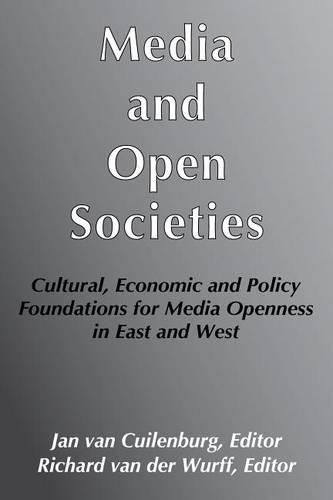Readings Newsletter
Become a Readings Member to make your shopping experience even easier.
Sign in or sign up for free!
You’re not far away from qualifying for FREE standard shipping within Australia
You’ve qualified for FREE standard shipping within Australia
The cart is loading…






Traditional, national and medium-specific regulatory models in communications policy in the East and West have become outdated. New, medium-neutral and internationally oriented regulatory models are replacing them. This book discusses how these new regulatory models can contribute to the emergence of an open society - that is, a society in which all have access to society’s information and communication resources in a non-discriminatory and affordable way. Experts from the Faculty of Journalism of Moscow State University, The Amsterdam School of Communications Research (ASCoR) of the University of Amsterdam, and other experts from Finland, the United Kingdom and Belgium address this question. The papers in this volume discuss key issues in the development of communications policies for open societies. These issues focus on the social responsibilities of media in a changing society; the role of competition in stimulating media innovation and diversity; and the potential of new media in strengthening user’s autonomy and empowerment. Expressing different historical contexts, the editors approach the issues from very different perspectives, but with the common objective of understanding the converging media dynamics in East and West. The resulting mix contributes to the debate surrounding the communications policies that will stimulate the development of global openness in the 21st century.
$9.00 standard shipping within Australia
FREE standard shipping within Australia for orders over $100.00
Express & International shipping calculated at checkout
Traditional, national and medium-specific regulatory models in communications policy in the East and West have become outdated. New, medium-neutral and internationally oriented regulatory models are replacing them. This book discusses how these new regulatory models can contribute to the emergence of an open society - that is, a society in which all have access to society’s information and communication resources in a non-discriminatory and affordable way. Experts from the Faculty of Journalism of Moscow State University, The Amsterdam School of Communications Research (ASCoR) of the University of Amsterdam, and other experts from Finland, the United Kingdom and Belgium address this question. The papers in this volume discuss key issues in the development of communications policies for open societies. These issues focus on the social responsibilities of media in a changing society; the role of competition in stimulating media innovation and diversity; and the potential of new media in strengthening user’s autonomy and empowerment. Expressing different historical contexts, the editors approach the issues from very different perspectives, but with the common objective of understanding the converging media dynamics in East and West. The resulting mix contributes to the debate surrounding the communications policies that will stimulate the development of global openness in the 21st century.